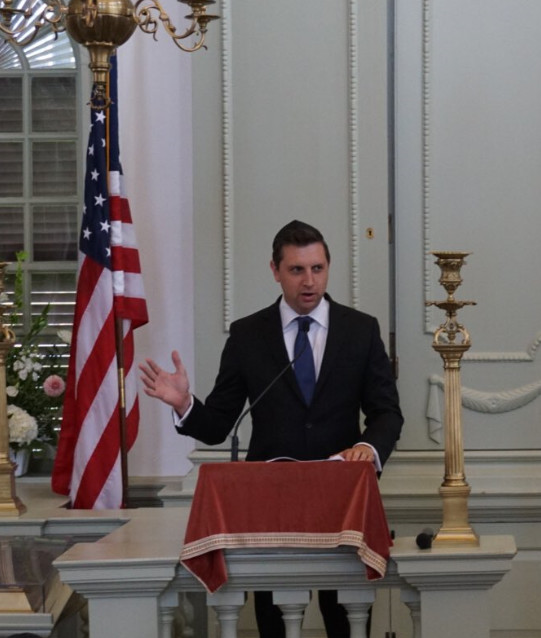RI Treasurer Seth Magaziner’s remarks at reading of George Washington’s letter
On Sunday, August 20, 2017, Rhode Island General Treasurer Seth Magaziner addressed Rhode Islanders gathered at Touro Synagogue in Newport for the 70th annual reading of George Washington’s 1790 letter to the Hebrew congregation of Newport in which President Washington affirmed the importance of religious tolerance and offers strong condemnation of bigotry.
“Given the events of the past week, the wisdom of our first and greatest President is as relevant as ever,” said Magaziner. “The tragic events in Washington’s home state of Virginia laid bare to the world that our nation’s journey toward a just and understanding society is far from complete.”
Magaziner’s remarks, as prepared for delivery, follow:
It is a true honor to be here with you once again for the reading of President Washington’s letter to the Jews of Newport, and to offer the enthusiastic greetings of the State of Rhode Island.
Of course, by the time President Washington wrote in support of religious tolerance, Rhode Island had already been at it for over a century. Indeed, religious tolerance is the very reason that Rhode Island exists.
Our state’s original founding charter - which in July of 1663 established the colony of Rhode Island - stated that no person residing in the colony could be "punished, disquieted, or called in question for any differences in opinion in matters of religion.”
As the son of a Jewish father and a Catholic mother, I am keenly aware that I would not be on this earth today but for the commitment our founders and our first president to religious freedom.
Given the events of the past week, the wisdom of our first and greatest president is as relevant as ever. The tragic events in Washington’s home state of Virginia laid bare to the world that our nation’s journey toward a just and understanding society is far from complete.
But even before Charlottesville, most of us knew this all too well.
I will never forget the first time I experienced direct anti-Semitism. I was a college student on my way to visit a friend on spring break, standing outside a train station in Springfield, Illinois, the Land of Lincoln. It was a quiet, sunny afternoon, and the streets were empty. I saw a man walk out of a bar across the square. He caught my eye and staggered over to me. He smelled of alcohol and sweat as he stood in front of me, his face no more than two inches from mine. “Are you a Jew?” he asked. My heart was racing, the blood rushed to my face, every second felt like an eternity. He said some other things that I won’t repeat today, before turning and wandering away. I will never forget that feeling. One that too many in this country feel today, on a daily basis, 227 years after Washington wrote his letter.
President Washington understood that true liberty, true freedom, is more than just equality under the law. In order for us to truly be free as human beings, we must be free not only from oppression but also from fear. “Everyone shall sit in safety under his own vine and fig tree and there shall be none to make him afraid.”
In times when the citizens of this country have felt afraid of each other, time and again we have looked to our presidents for moral leadership, to remind us of our founding ideals, to remind us that we must treat each other with decency. Today we lack such leadership, so instead we must look to each other for strength and inspiration.
Together let’s stand for what is right, as our founders did so many years ago.
Let us be clear that there is no moral equivalency between those who fight to divide us by religion and race, and those who fight to bring us together.
Let us learn from our mistakes as a nation, and never turn our backs to refuges of any race or religion who are fleeing violence and persecution.
And today, in this sacred place, let us remember together that there are no second-class faiths.
As we read aloud the words of Moses Seixas and George Washington, I pray that in these uncertain times the people of America and the people of the world will look to us here in Rhode Island, and find Hope.








